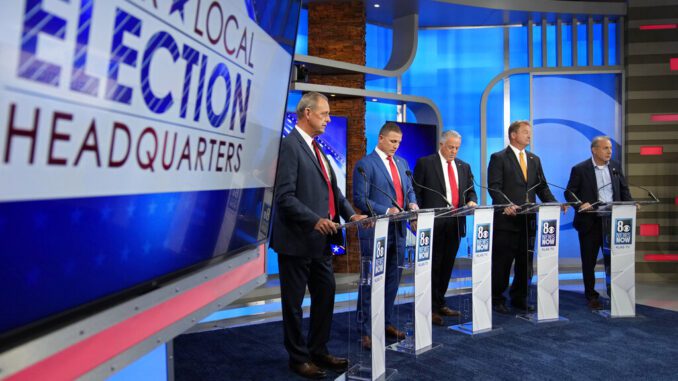
COLUMBIA, S.C. — More than halfway through a tumultuous primary season, voters have rendered verdicts in a number of contests, many of which featured candidates arguing they best represented a continuation of policies favored by former President Donald Trump.
While not on the ballot himself, Trump has played a role in several races, with candidates bearing his endorsement meeting a variety of electoral outcomes. There have also been tumbles by several incumbents, some taken out by Trump-backed challengers and others bested by fellow representatives in faceoffs forced by redistricting.
Here’s what’s happened so far in primary races across the country:
FALLEN INCUMBENTS
Eight incumbents — three Democrats and five Republicans — lost their U.S. House seats already this year after being defeated in their primary elections.
Four of those losses came in incumbent-on-incumbent races, a result of the once-a-decade redistricting process. But the other four were defeated by insurgent challengers after finding themselves vulnerable as a result of scandal, investigation, irritating progressives or crossing Trump.
Seven-term Democratic U.S. Rep. Kurt Schrader of Oregon fell to progressive challenger Jamie McLeod-Skinner in his May 17 primary. Schrader had angered many Democrats by opposing some of President Joe Biden’s priorities, including a $1.9 trillion coronavirus pandemic relief bill because he didn’t support a minimum wage increase.
Republican Rep. Madison Cawthorn of North Carolina was defeated by state Sen. Chuck Edwards after a whirlwind of scandals that included Cawthorn saying he’d been invited to orgies and had seen opponents of drug addiction use cocaine, getting caught twice with guns at airports and appearing in videos showing him in sexually suggestive poses.
On June 14, five-term GOP Rep. Tom Rice of South Carolina lost his reelection bid to state Rep. Russell Fry after voting to impeach Trump over the Jan. 6 Capitol riot. And on June 28, six-term Mississippi Republican Rep. Steven Palazzo lost a runoff to Sheriff Mike Ezell after being accused in a congressional ethics report of misspending campaign funds.
MEMBER-ON-MEMBER FACEOFFS
Redistricting guaranteed that some U.S. House incumbents would be ousted.
The first to fall was Republican Rep. David McKinley of West Virginia, who voted with Democrats in support of Biden’s $1.2 trillion infrastructure bill, betting that West Virginians would reward him for prioritizing such funding in one of the nation’s poorest states. Instead, they dumped him for Rep. Alex Mooney, who opposed the infrastructure bill.
In Georgia, Democratic Rep. Lucy McBath, a gun control advocate, went district shopping after a GOP-dominated Legislature turned her home area into a Republican stronghold. She defeated fellow Democratic Rep. Carolyn Bourdeaux, who said she’d considered McBath like a “sister.”
Two Illinois incumbents lost their seats when Republican Rep. Mary Miller defeated five-term Republican Rep. Rodney Davis, and Democratic Rep. Sean Casten beat one-term Democratic Rep. Marie Newman.
TRUMP: KEEPING SCORE
Trump helped lift some U.S. Senate candidates to victory. In Ohio, he backed “Hillbilly Elegy” author JD Vance after a furious push by Vance’s opponents to win Trump’s favor. The endorsement just three weeks before the election propelled Vance to a win.
Dr. Mehmet Oz got Trump’s seal of approval about five weeks before Pennsylvania’s primary, a blow to former hedge fund CEO David McCormick, whose wife, Dina Powell, served in Trump’s administration. Oz eked out a slim victory over McCormick after a recount.
In North Carolina, Trump endorsed Rep. Ted Budd a year before his primary, elevating the congressman from a 14-candidate field to win the GOP Senate nomination.
Katie Britt nearly won a GOP primary outright to replace her boss, retiring Alabama Sen. Richard Shelby, but ended up in a runoff with longtime Rep. Mo Brooks, whom Trump initially supported before pulling his endorsement. Trump endorsed Britt only after she finished first in the primary.
LOOK AHEAD
Primary season resumes in earnest in August, with a number of high-profile races still to be decided.
Rep. Liz Cheney faces a stiff primary challenge in Wyoming on Aug. 16 after voting to impeach Trump and becoming vice chair of the House committee investigating the Capitol riot. Trump has endorsed Harriet Hageman in the race.
In Arizona, one of five battleground states Biden flipped, the former president endorsed a slate of loyalists who promote his election concerns. In the governor’s race, he backed former TV news anchor Kari Lake over developer Karrin Taylor Robson for the GOP nomination to replace Republican Gov. Doug Ducey.
In Arizona’s U.S. Senate race, Trump supports investor Blake Masters for the GOP nomination to face Democratic incumbent Mark Kelly in November.
In Michigan, one of the country’s top battleground states, Republicans have faced setbacks in their bid to defeat Democratic Gov. Gretchen Whitmer in November. Five GOP candidates failed to qualify for the Aug. 2 primary after submitting fake signatures collected by paid petition circulators.
Establishment Republicans are worried about the Aug. 2 GOP primary for U.S. Senate in Missouri, where former Gov. Eric Greitens is trying to make a political comeback, following his resignation four years ago amid investigations into possible campaign finance issues and into whether he blackmailed a woman against speaking about their extramarital affair. Some Republicans fear Greitens would be a weak general election candidate who could cede a safe seat to Democrats.



